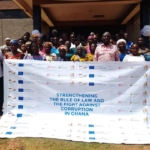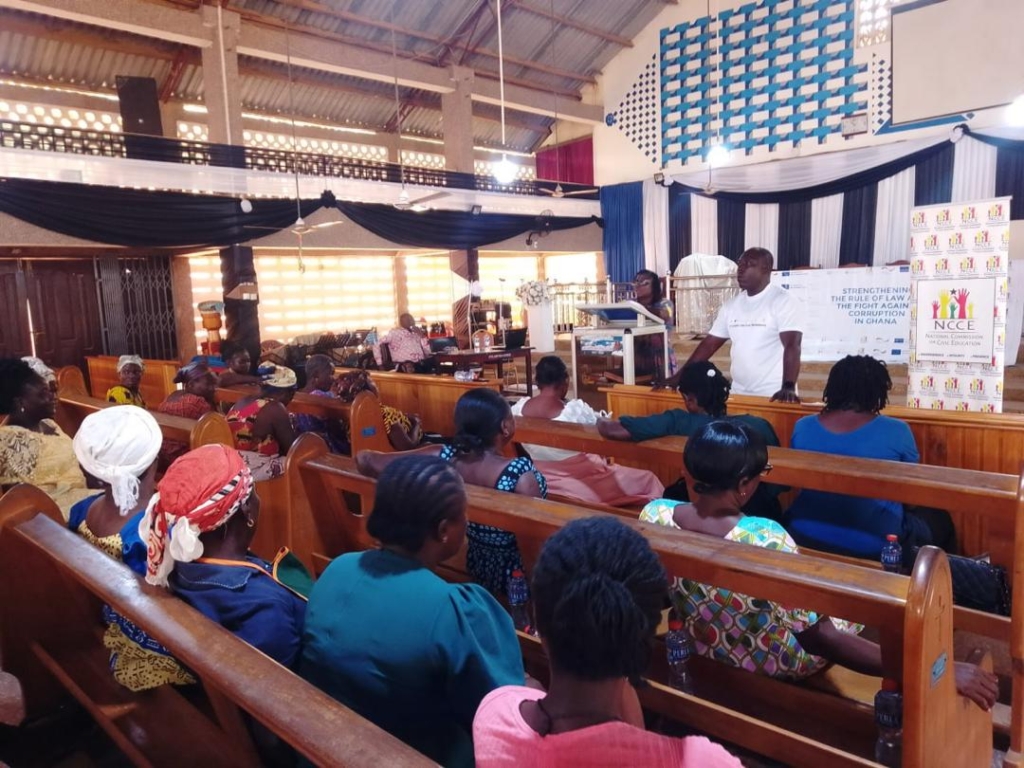
Women have been urged to take a bold and active stand in the fight against corruption by remaining vigilant and reporting all suspected corrupt acts to the appropriate authorities.
The call was made by the Volta Regional Director of the National Commission for Civic Education (NCCE), Mr Kenneth Kponor, during an engagement with women’s groups at Anfoega on the theme “Civic Engagement on the Rule of Law and the Fight Against Corruption.”
The project, organised by the NCCE, was co-sponsored by the European Union (EU), Deutsche Gesellschaft für Internationale Zusammenarbeit (GIZ), the German Federal Ministry for Economic Cooperation and Development (BMZ), the State Secretariat for Economic Affairs (SECO), and German Cooperation. It seeks to empower women with knowledge of their rights, responsibilities, and legal protections while strengthening their role in promoting transparency and accountability within their communities.

Mr Kponor noted that many women encounter corruption in their daily lives but often fail to report it — either out of fear of victimisation or uncertainty about the proper reporting channels.
He assured participants that Ghana’s laws provide protection for those who expose corrupt practices and urged women to be assertive in demanding fairness and justice.
“The fight against corruption begins with awareness and courage,” he said. “Women must be bold to speak up — because silence only protects the corrupt.”
The meeting, held at the EP Church Auditorium in Anfoega, brought together market women, traders, and leaders of women’s associations across the district. It was jointly facilitated by the Commission on Human Rights and Administrative Justice (CHRAJ) and the NCCE.
The North Dayi District Director of the NCCE, Mr Simon Mawuko, stressed the importance of the rule of law, explaining that it guarantees equality before the law and protects the rights of all citizens, especially women.
“The 1992 Constitution is not just a legal document,” he said. “It is a shield for every Ghanaian woman. It protects your right to education, your freedom from discrimination, and your safety from harmful practices.”
He encouraged women to see the Constitution not as a distant document but as a living tool for demanding justice and accountability in their everyday lives — from the marketplace to local governance.
In her presentation, Madam Josephine Avedzi of CHRAJ highlighted how corruption disproportionately affects women, particularly those who are caregivers and small-scale traders.
“When a nurse demands a token before treating your sick child, or when an official insists on a bribe to issue a market permit, it is not just a transaction — it is exploitation,” she said. “Corruption deepens poverty and restricts opportunities, making women both victims and key fighters in the battle against it.”
Madam Avedzi also reminded participants that good citizenship goes beyond complaints — it involves paying taxes, reporting wrongdoing, and holding leaders accountable.

The engagement also introduced the concept of “Community Integrity,” which resonated strongly with the market women. Participants discussed fair pricing, accurate measurement, and honesty in trade.
“A market known for integrity attracts more customers and grows stronger. When we hold each other accountable, we build a community we can all be proud of,” one market leader remarked.
The NCCE team demonstrated practical tools and reporting channels available for whistleblowing and tracking corrupt acts.
In closing, Mr Kponor encouraged women to take ownership of the anti-corruption campaign within their communities.
“The fight against corruption starts with you,” he declared. “Your collective voice is the most powerful weapon we have.”
Inspired by the session, participants pledged to form community watchdog groups within their market associations and neighbourhoods to promote integrity, transparency, and active citizenship.